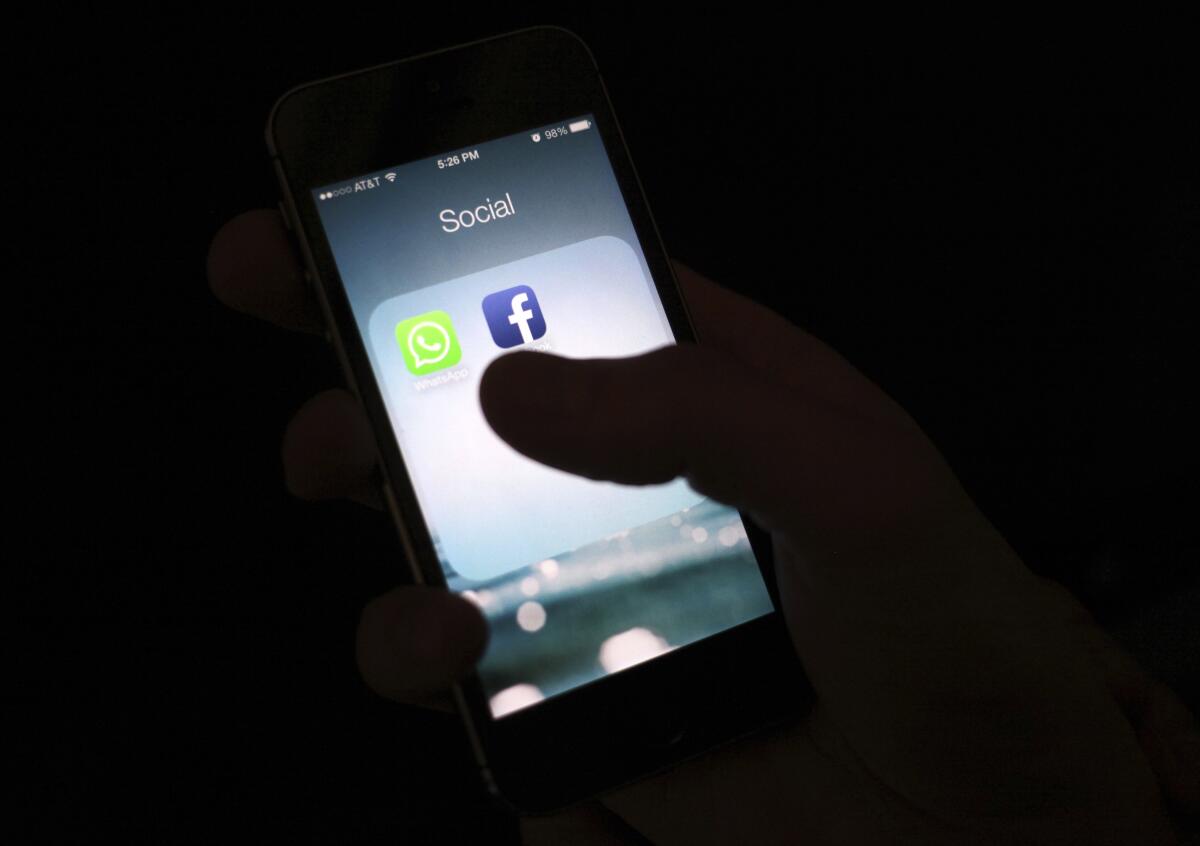Op-Ed: The end of Roe means we’ll be criminalized for more of our data

- Share via
Our phones know more about us than our families and friends do. They know what we watch, what we’ve searched for and whom we’ve emailed, not just recently but stretching back months and years. The leak of a draft opinion indicating the Supreme Court’s intent to overturn Roe vs. Wade raises huge concerns for how online searches, text messages and emails can be used to target and criminalize pregnant people seeking abortion care and support.
Digital autonomy and bodily autonomy are inextricably linked. Just as we need the right to ownership and control over our bodies, we should have the same over our data. But this has not been the case.
Digital devices collect a remarkable amount of information about where people go, who they are in contact with and what they surf the internet about. A 2020 report from the technology policy organization Upturn details how widespread — and unregulated — digital device extraction tools are in the U.S. These tools are used by police, school, housing and immigration agencies to wrench information from smartphones.
If Roe vs. Wade is overturned, personal data collected via the internet could become evidence of criminal intent if women seek an abortion.
Police have broad authority to subpoena digital data when someone is suspected of a crime — which abortion will surely become in many states. Once in police possession, software can be used by officers to translate smartphone data so it can be searched by keyword or image. They can organize communications, location data and other events into chronological digests or map them onto geographic maps or social networks.
All this information is likely more incriminating in a post-Roe world than, for example, apps people use to track menstrual periods. Although those apps have a direct connection to reproductive cycles, it’s more likely that law enforcement and others will use more common digital activity to determine if someone has searched for abortion pills, communicated with abortion providers or related services, or even if they’ve traveled out of state for care.
At least as far back as 2015, we’ve seen law enforcement extract data from devices and present it as evidence in criminal cases against women facing charges related to terminating their pregnancies.
Police departments have used data with few restrictions. In Wisconsin last year, for example, the state Supreme Court permitted the use of digital evidence downloaded from someone’s cellphone in a case — even though the data were extracted by the police department in one county for one investigation, then used months later by the sheriff’s department in another county for a different case.
Abortion is still legal as the country awaits an official decision from the U.S. Supreme Court, but it’s not too early for individuals to reduce the digital footprint of their internet research into abortion and related services. It’s also not too late to reconsider data protections that include large loopholes for law enforcement.
Although it is impossible to completely delete your digital footprint, there are steps to shrink it — and make others have to pay, litigate, get a warrant, hack or otherwise work to get it.
If the Supreme Court overturns Roe vs. Wade, it would be foolish to think that the rights to same-sex marriage and contraception are safe.
Three steps can help.
First, don’t hand over your phone to anyone. Consenting to a search of a personal digital device amounts to digital self-incrimination without a Miranda warning. Yet the Upturn report found that most people hand over their devices to state agencies not knowing they don’t have to. Michigan is the only state whose constitution requires law enforcement to secure a warrant to search digital devices. A few other states, like Utah and California, require a warrant by statute.
Second, wherever possible, use secure communication platforms. End-to-end encrypted apps, such as Signal, are better than SMS texts and chat communications using services such as Google Chat or WhatsApp. Encrypted apps, which can import your old contacts, don’t store the content of your text messages. Features to make messages disappear from encrypted apps should be turned on even for the most casual or innocuous messages.
Third, use tools that prioritize internet privacy. Web browsers such as Tor conceal user location and online activity, and search engines such as DuckDuckGo don’t store or share user data. For a cost, virtual private networks (VPNs) shield your website visits from internet service providers, which could be subpoenaed for your data by authorities.
But none of these efforts is a substitute for more robust protections of our digital autonomy. Data brokers make massive profits trading the information we relinquish to them via the technology our lives depend on. Even California — often held up as having strong digital privacy laws — leaves broad exceptions for authorities to access personal data, and these laws more generally do not account for how much private data can be accessed without a warrant. Law enforcement and private citizens can also simply buy some personal data from private companies. Now is the time for us to demand ownership and control over our data.
For people whose reproductive choices end up criminalized, many reproductive justice organizations already offer resources. The Digital Defense Fund uses technology to defend and secure abortion access. The Repro Legal Defense Fund covers bail and legal costs for people being prosecuted for self-managed abortions, and their partner organization If/When/How runs a Repro Legal Helpline that provides free, confidential legal information and advice about self-managed abortion.
Reproductive freedom is indivisible from all other forms of freedom. The outpouring of nationwide protest in defense of Roe makes it clear that our communities are essential to defending our rights. We work to keep one another safe. Our devices and our democracy should do the same.
Cynthia Conti-Cook is a civil rights lawyer and tech fellow at the Ford Foundation. Kate Bertash is the director of the Digital Defense Fund.
More to Read
A cure for the common opinion
Get thought-provoking perspectives with our weekly newsletter.
You may occasionally receive promotional content from the Los Angeles Times.












